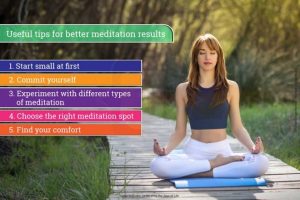Patient Information
Providing caring, compassionate and expert care to get you back to better health.
Stand up for your Health - by Sitting Down to Meditate
The mind is our most valuable and precious resource through which we experience every single moment of our life. The mind that we rely upon to be happy, emotionally stable as individuals, and at the same time, be focused, creative, and to perform at our very best in everything that we do. And yet, our mind tends to be a commonly overlooked aspect of our daily health routine. The result, of course, is that we get stressed. Meditation and mindfulness are practices – often using breathing, quiet contemplation or sustained focus on something, such as an image, phrase or sound – that offers the opportunity to step back and help let go of stress. With an increased ability to focus and direct our attention, we can strengthen all areas of our life and help us feel more balanced and connected. Recent studies have offered promising results about the positive impact of practicing meditation on our health and wellbeing.
It could help:
- Lower blood pressure – reducing your risk of heart disease
- increase ability to process information, helping to make better decisions
- slow the cognitive effects of aging
- reduce inflammation
- support the immune system
- reduce symptoms of menopause
- control the brain’s response to pain
- improve sleep and help manage insomnia
- reduce depression, anxiety and stress levels by helping to relax the nervous system and relieve muscle tension
Ways to Meditate
Meditation is an umbrella term for the many ways to a relaxed state of being. There are many types of meditation and relaxation techniques that have meditation components. All share the same goal of achieving inner peace.
Find the method that works for you:
- Guided meditation: Sometimes called guided imagery or visualization, with this method of meditation you form mental images of places or situations you find relaxing.
- Mantra meditation: In this type of meditation, you silently repeat a calming word, thought or phrase to prevent distracting thoughts.
- Mindfulness meditation: This type of meditation is based on being mindful, or having an increased awareness and acceptance of living in the present moment. You focus on what you experience during meditation, such as the flow of your breath. You can observe your thoughts and emotions, but let them pass without judgment.
- Qi gong: This practice generally combines meditation, relaxation, physical movement and breathing exercises to restore and maintain balance. Qi gong is part of traditional Chinese medicine.
- Tai chi: This is a form of gentle Chinese martial arts. In tai chi, you perform a self-paced series of postures or movements in a slow, graceful manner while practicing deep breathing.
- Transcendental Meditation: is a technique that allows your mind to focus inward, staying alert to other thoughts or sensations without allowing them to interfere. It’s typically done seated with your eyes closed for 20 minutes, twice a day.
- Yoga: You perform a series of postures and controlled breathing exercises to promote a more flexible body and a calm mind. As you move through poses that require balance and concentration, you’re encouraged to focus less on your busy day and more on the moment.
How to get Started?
Don’t let the thought of meditating the ‘right’ way add to your stress. If you’re not sure how to get started, look for local classes on meditation, get recommendations from friends, or research different types that interest you. But you can also practice meditation easily on your own – all you really need is a few minutes of quality time.

Tip 1: Focus Attention
Close your eyes and focus your attention on such things as a specific object, an image, a mantra, or even your breathing. Focusing your attention is generally one of the most important elements of meditation to help free your mind from the many distractions that cause stress and worry.
Tip 2: Relax Breathing
Focus on deep, even-paced breathing using the diaphragm muscle to expand your lungs. The purpose is to slow your breathing, take in more oxygen, and reduce the use of shoulder, neck and upper chest muscles while breathing so that you breathe more efficiently.
Tip 3: Quiet Setting
If you’re a beginner, practicing meditation may be easier if you’re in a quiet spot with few distractions such as no tech devices. As you get more skilled at meditation, you may be able to do it anywhere, especially in high-stress situations where you benefit the most from meditation, such as a traffic jam, a stressful work meeting or a long line at the grocery store.
Tip 4: Comfortable Position
You can practice meditation whether you’re sitting, lying down, walking, or in other positions or activities. Just try to be comfortable so that you can get the most out of your meditation. Aim to keep good posture during meditation.
Tip 5: Scan your Body
Focus attention on different parts of your body. Become aware of your body’s various sensations, whether that’s pain, tension, warmth or relaxation. When your mind wanders (and it will!), gently bring it back to the breath again. Let thoughts pass through your mind without judgment. Gradually increase the amount of time you’re able to stay focused.
Remember….
There’s no right way or wrong way to meditate. While meditation can help you manage stress, sleep well and feel better, it shouldn’t replace lifestyle changes like eating healthier, managing your weight, and getting regular physical activity. It’s also not a substitute for medication or medical treatment your doctor may have prescribed. Try different types of meditation to find what works for you, and make it a regular part of your healthy lifestyle.
Content Sources:
- Thorpe M. (2017). 12 Science-Based Benefits of Meditation. Retrieved from: https://www.healthline.com/nutrition/12-benefits-of-meditation#section1.
- Meditation – Headspace. Retrieved from: https://www.headspace.com/meditation/techniques.